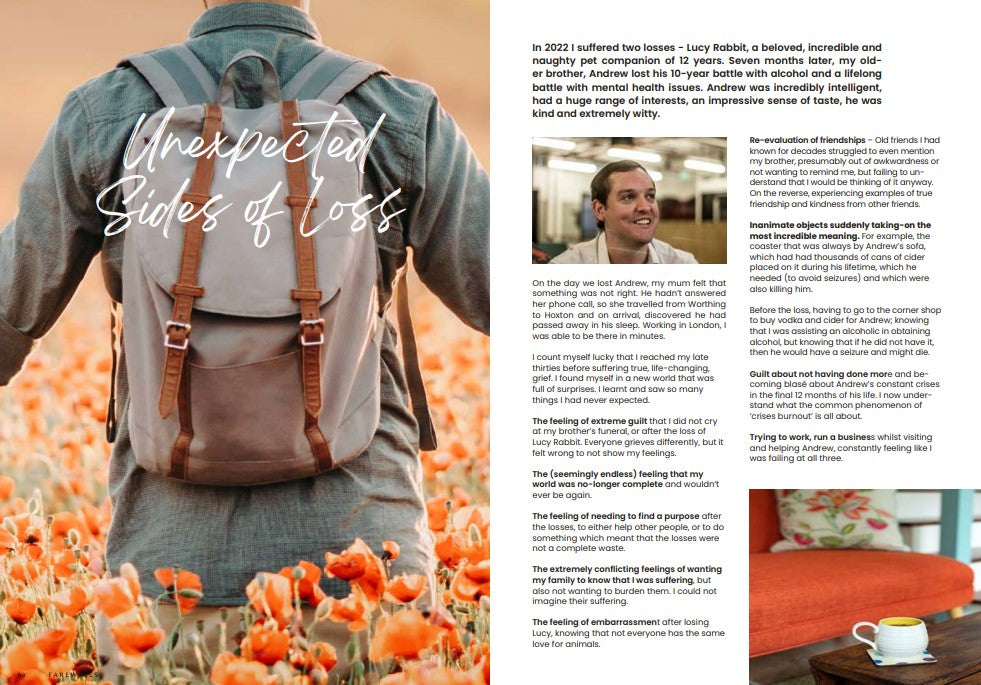In 2022 I suffered two losses – Lucy Rabbit, a beloved, incredible and naughty pet companion of 12 years.
Seven months later, my older brother, Andrew lost his 10-year battle with alcohol and a lifelong battle with mental health issues. Andrew was incredibly intelligent, had a huge range of interests, an impressive sense of taste, he was kind and extremely witty.
On the day we lost Andrew, my mum felt that something was not right. He hadn’t answered her phone call, so she travelled from Worthing to Hoxton and on arrival, discovered he had passed away in his sleep. Working in London, I was able to be there in minutes.
I count myself lucky that I reached my late thirties before suffering true, life-changing, grief. I found myself in a new world that was full of surprises. I learnt and saw so many things I had never expected.
The feeling of extreme guilt that I did not cry at my brother’s funeral, or after the loss of Lucy Rabbit. Everyone grieves differently, but it felt wrong to not show my feelings.
The (seemingly endless) feeling that my world was no-longer complete and wouldn’t ever be again.
The feeling of needing to find a purpose after the losses, to either help other people, or to do something which meant that the losses were not a complete waste.
The extremely conflicting feelings of wanting my family to know that I was suffering, but also not wanting to burden them. I could not imagine their suffering.
The feeling of embarrassment after losing Lucy, knowing that not everyone has the same love for animals.
Re-evaluation of friendships – Old friends I had known for decades struggled to even mention my brother, presumably out of awkwardness or not wanting to remind me, but failing to understand that I would be thinking of it anyway. On the reverse, experiencing examples of true friendship and kindness from other friends.
Inanimate objects suddenly taking-on the most incredible meaning. For example, the coaster that was always by Andrew’s sofa, which had had thousands of cans of cider placed on it during his lifetime, which he needed (to avoid seizures) and which were also killing him.
Before the loss, having to go to the corner shop to buy vodka and cider for Andrew; knowing that I was assisting an alcoholic in obtaining alcohol, but knowing that if he did not have it, then he would have a seizure and might die.
Guilt about not having done more and becoming blasé about Andrew’s constant crises in the final 12 months of his life. I now understand what the common phenomenon of ‘crises burnout’ is all about.
Trying to work, run a business whilst visiting and helping Andrew, constantly feeling like I was failing at all three.
Battling addiction treatment and social care providers to try and obtain even the most basic level of care or support for Andrew, failing at every single turn, and feeling that nobody actually had an interest in helping him or us. I feel that this was a result of lack of resources, and possibly crises burnout by those in the various organisations; it is simply impossible to remain on ‘high alert’ for an extended period.
After the loss, came waiting, and then more waiting. Waiting with Andrew’s body for hours, for the coroner to arrive, knowing that it would be the last time we would really be with him. Having to wait three weeks for the autopsy. Waiting five months for the inquest. The seemingly endless wait for probate. Knowing that we couldn’t even start to think of coming to terms with what had happened, until we had got through all of the above.
Preparing for the funeral and feeling that if we did not choose the most expensive options, we were doing Andrew a dis-service. Worrying that if we did not make every aspect of the funeral unique to Andrew, we were not giving him a proper send-off. Luckily my mum is a complete force, and discovered the beautiful Hoxton Hall, where we had an incredible ceremony for Andrew.
The family walked along behind the hearse, up Hoxton High Street, and the whole street came to a standstill. Feeling that this was the first time in Andrew’s life that he was ever really acknowledged by the outside world. Booking Andrew’s favourite eatery, Mandalay Café, for lunch after the funeral, where we could all enjoy a curry that my brother would have loved (with lots of chillis on the side!).
Work, following a loss. Discovering that my workplace has a rigid policy that five days’ compassionate leave is the maximum you can take, regardless of how you have been affected and in what circumstances. Having to fit the funeral, funeral preparation and dealing with his estate, into those five days. Work not telling any of my colleagues about what had happened, so having to explain to them, over and over, about why I had been away. Being told that attending my brother’s inquest did not meet the requirements for compassionate leave. My employer forgetting to send the usual commiseration bunch of flowers.
Handling the digital legacy. Trying to unsubscribe from endless different online accounts. Unsubscribing from TFL emails & realising that Andrew didn’t need a TFL account anymore; he would never be going to a train station again or doing something as simple as taking a tube to work or a restaurant. Going through laptops and iPads to make sure that I didn’t lose any document or something that could give my family and I, an insight into Andrew.
The miscellaneous and ongoing effects of loss. Guilt that money Andrew left me, has helped me. Making space for Andrew in my life, to care and and help him, becoming closer to him, then him disappearing, leaving a painful space. The conflicting feelings of being glad that Andrew would no-longer be feeling this pain, but at the same time feeling that we, and the world, had been deprived of an incredible and unique being. Keeping Andrew’s clothes stacked together, packed at the back of my wardrobe, to help them keep the smell of him and his flat, for as long as possible. Never knowing whether to say I have, or I had a brother, or whether there are three or four of us siblings.
I recently attended a conference and was talking to a colleague who unexpectedly lost his wife. When asking him about it, he simply said “It’s not great at the moment, but I have to keep going, believing it will get better”. I think that’s what we all must know and focus on.
Time is a great healer, even if it will never be the same life that we had before.
David Holmes is the founder of Ashes to Blooms, a service in Worthing, who create bespoke memorial wildflower seed balls using the ashes of clients’ loved ones, whether a family member, friend, or beloved pet/animal companion. Clients can then share or spread the seed balls in their gardens or grow them in planters, allowing them to create wildflower memorials to their loved ones. For more information, see www.ashestoblooms.com. Alternatively, call David on 07732 095 257.
Topics in this post: wildflower seed mix, seed bombs, native wildflower seeds, seed balls, wild flower bomb seeds, keepsakes made from ashes, what to do with ashes, wildflower memorials, wild flower memorials, ashes keepsake ideas, pet memorials, dog ashes ideas, pet ashes ideas, memorial ashes into keepsakes, remember a loved one, celebrate your pet, dog ashes ideas UK, wildflower bombs, wildflower seed bombs, wild flower seed bombs, creating a wildflower garden, make your own seed bombs, wildflower seed balls UK, wild flower seed mix bulk, wild grass seed mix, flower seed balls, flower bombs for bees, wildflower seeds for pots

